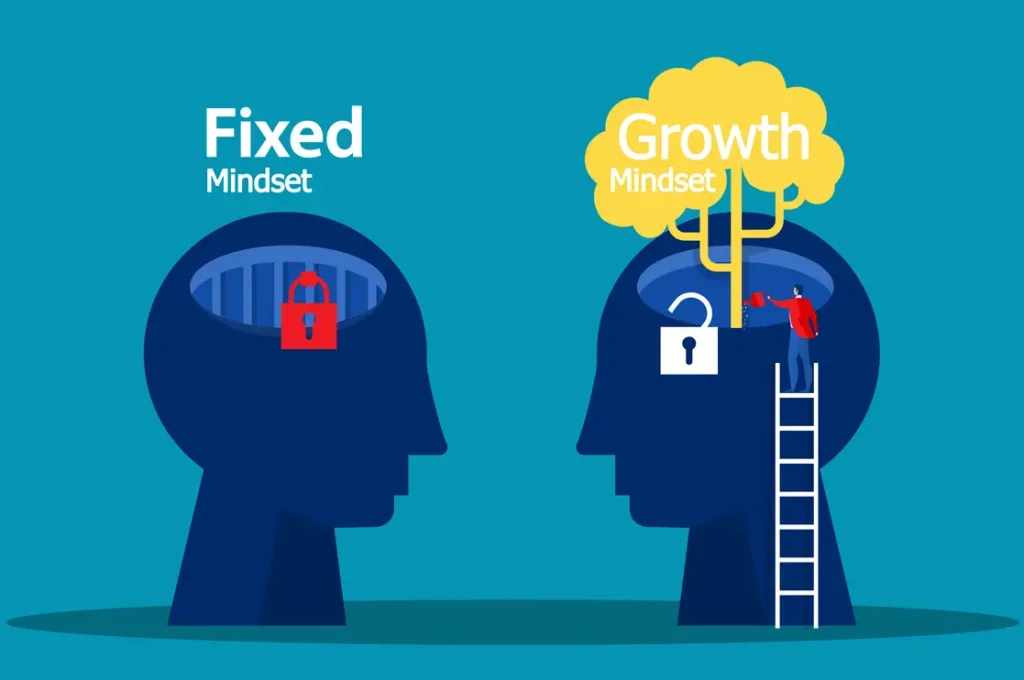In our fast-changing world, having the right mindset is more important than ever. While some people see obstacles as barriers, others see them as stepping stones for growth. This difference in perspective is often due to something called a “growth mindset.”
Unlike a fixed mindset, which sees abilities and intelligence as static, a growth mindset believes that you can develop and improve through effort, learning, and perseverance. This approach to life can significantly impact how you handle challenges, achieve your goals, and unlock your full potential.
Adopting a growth mindset isn’t just a motivational buzzword, it’s a powerful tool that can change the way you think, learn, and succeed. Let’s dive into what a growth mindset is, why it’s beneficial, and how you can cultivate it in your everyday life.
What Exactly Is a Growth Mindset?
At its core, a growth mindset is the belief that skills, intelligence, and abilities are not fixed traits. Instead, they can be developed over time through dedication and hard work. This concept, introduced by psychologist Carol Dweck, contrasts sharply with a fixed mindset, where people believe that their qualities are set in stone and cannot be changed.
People with a growth mindset see challenges as opportunities for growth, not as threats. They understand that effort and persistence are crucial for success, and they are more likely to take risks, analyze feedbacks, and persist in the face of setbacks. In other words, they view failure as a chance to learn and grow rather than a reflection of their abilities.
Why Does a Growth Mindset Matter?
Having a growth mindset brings a host of benefits. First and foremost, it fosters resilience. Life is full of ups and downs, and a growth mindset helps you bounce back from adversity. When you believe that you can improve and adapt, setbacks don’t seem as overwhelming.
Moreover, a growth mindset encourages continuous learning. When you are open to new experiences and eager to learn, you are more likely to take on challenges that push you out of your comfort zone. This constant pursuit of knowledge and self-improvement can lead to personal and professional success.
Additionally, individuals with a growth mindset are more motivated and engaged, which often results in higher performance and greater satisfaction in life.
Tips to Cultivate a Growth Mindset

Now that we understand what a growth mindset is and why it’s beneficial, let’s explore some practical tips to help you develop and maintain this positive way of thinking:
- Take On Challenges
Instead of shying away from difficult tasks, lean into them. Challenges are opportunities to learn and grow. When faced with a tough situation, remind yourself that it’s a chance to develop new skills and gain experience. By viewing challenges as opportunities rather than threats, you open yourself up to new possibilities.
- Learn from Feedback
Feedback, especially when it’s constructive, is a valuable tool for growth. Rather than taking criticism personally, use it to improve. Ask yourself what you can learn from the feedback and how you can use it to enhance your skills or performance. Remember, feedback is not a reflection of your worth; it’s an opportunity for growth.
- Celebrate Effort, Not Just Results
Focusing only on outcomes can be discouraging, especially if success is not immediate. Instead, celebrate the effort and hard work you put into your tasks. Acknowledge the progress you make, no matter how small. This practice helps maintain motivation and encourages a positive attitude toward learning and improvement.
- Adopt a Positive Attitude Towards Failure
Everyone makes mistakes, but it’s how you respond to them that matters. Instead of seeing failure as a sign of incompetence, view it as a learning experience. Ask yourself what went wrong, what you could do differently next time, and how you can grow from the experience. This shift in perspective can turn setbacks into valuable lessons.
- Set Realistic and Achievable Goals
Breaking down larger goals into smaller, more manageable steps makes them less overwhelming. This approach not only helps you stay focused but also gives you a sense of achievement as you reach each milestone. Setting realistic goals ensures steady progress and keeps you motivated to continue your journey towards personal growth.
Real-Life Examples of a Growth Mindset
It’s inspiring to see how many successful individuals have adopted a growth mindset. Take, for example, Michael Jordan, one of the greatest basketball players of all time. He didn’t make his high school basketball team initially. Rather than letting this setback define him, he used it as motivation to work harder. His determination and commitment to improving his skills led to a legendary career in basketball. Similarly, J.K. Rowling, the renowned author of the Harry Potter series, faced numerous rejections from publishers before her work was accepted. Her belief in her writing and her determination to succeed exemplify the power of a growth mindset.
How to Apply a Growth Mindset in Daily Life
A growth mindset isn’t just for athletes or authors—it’s something anyone can adopt and apply in their daily lives. In the workplace, for instance, a growth mindset encourages collaboration, innovation, and problem-solving. Employees who believe in their ability to learn are more likely to take on new challenges, seek out training, and contribute to team projects.
At home, this mindset can improve relationships by encouraging open communication and a willingness to resolve conflicts. By fostering a culture of learning and improvement, both individuals and communities can thrive.
In summary, developing a growth mindset is a powerful way to enhance your personal and professional life. By taking on challenges, learning from feedback, and viewing failures as opportunities, you can unlock your potential and achieve your goals.
This mindset fosters resilience, continuous learning, and a positive outlook, making it a valuable asset in our ever-changing world. So, start today by practicing these tips, and remember that the journey of growth is ongoing. With dedication and effort, you can cultivate a mindset that will lead to success and fulfillment in all areas of your life.






